Author: dorner
Primary Sources: Women at Work during World War II: Rosie the Riveter and the Women’s Army Corps
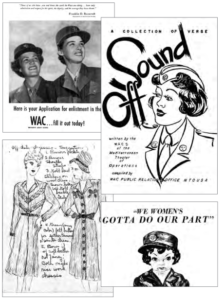 A new Library acquisition is Women at Work during World War II: Rosie the Riveter and the Women’s Army Corps. This module contains two major sets of records documenting the experience of American women during World War II: Records of the Women’s Bureau of the U.S. Department of Labor, and Correspondence of the Director of the Women’s Army Corps. Primary sources document a wide range of issues pertinent to women during this time of turbulent change, including studies on the treatment of women by unions in several midwestern industrial centers, and the influx of women to industrial centers during the war. Topics covered in records and correspondence include women’s work in war industries, pivotal issues like equal pay, childcare and race, and extensive documentation on the women who joined and served in the Women’s Army Corps as WACs.
A new Library acquisition is Women at Work during World War II: Rosie the Riveter and the Women’s Army Corps. This module contains two major sets of records documenting the experience of American women during World War II: Records of the Women’s Bureau of the U.S. Department of Labor, and Correspondence of the Director of the Women’s Army Corps. Primary sources document a wide range of issues pertinent to women during this time of turbulent change, including studies on the treatment of women by unions in several midwestern industrial centers, and the influx of women to industrial centers during the war. Topics covered in records and correspondence include women’s work in war industries, pivotal issues like equal pay, childcare and race, and extensive documentation on the women who joined and served in the Women’s Army Corps as WACs.
Primary Sources: FBI Confidential Files and Radical Politics in the U.S., 1945-1972
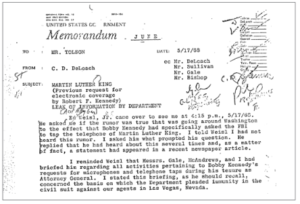 Another recent acquisition of the Library is the ProQuest History Vault module, FBI Confidential Files and Radical Politics in the U.S., 1945-1972. Under the leadership of J. Edgar Hoover, the FBI vigorously investigated and tracked the activities of Communist groups, Communist-front groups, and other radical organizations in the U.S. This module consists of records of the FBI and the Subversive Activities Control Board from 1945-1972.
Another recent acquisition of the Library is the ProQuest History Vault module, FBI Confidential Files and Radical Politics in the U.S., 1945-1972. Under the leadership of J. Edgar Hoover, the FBI vigorously investigated and tracked the activities of Communist groups, Communist-front groups, and other radical organizations in the U.S. This module consists of records of the FBI and the Subversive Activities Control Board from 1945-1972.
Highlights of this module include J. Edgar Hoover’s office files; documentation on the FBI’s so-called “black bag jobs,” as they were called before being renamed “surreptitious entries”; and the “Do Not File” File. The “Do Not File” file consists of records that were originally supposed to be destroyed on FBI Director J. Edgar Hoover’s order, however, through both intended and inadvertent exceptions to this order, large portions of these files survived. Another key collection in this module consists of the records of the Subversive Activities Control Board (SACB). The SACB files constitute one of the most valuable resources for the study of left-wing radicalism during the 1950s and 1960s.
Primary Sources: Southern Life and African American History, 1775-1915, Plantation Records, Part 2
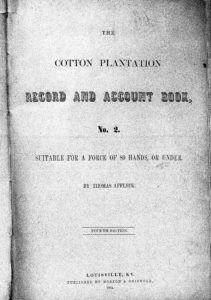 The Library has recently acquired the second set of Plantation Records in ProQuest History Vault. The records presented in this module come from the University of Virginia and Duke University. Major collections from the holdings of the University of Virginia include the Tayloe Family Papers, Ambler Family Papers, Cocke Family Papers, Gilliam Family Papers, Barbour Family Papers, and Randolph Family Papers. Major collections from the Duke University holdings document plantation life in the Alabama, as well as South Carolina, Georgia, North Carolina, Virginia, and Maryland.
The Library has recently acquired the second set of Plantation Records in ProQuest History Vault. The records presented in this module come from the University of Virginia and Duke University. Major collections from the holdings of the University of Virginia include the Tayloe Family Papers, Ambler Family Papers, Cocke Family Papers, Gilliam Family Papers, Barbour Family Papers, and Randolph Family Papers. Major collections from the Duke University holdings document plantation life in the Alabama, as well as South Carolina, Georgia, North Carolina, Virginia, and Maryland.
Event: Art + Feminism Wikipedia Edit-a-Thon Tuesday, March 21

Art + Feminism Wikipedia Edit-a-Thon
Drop in any time, stay as long as you like!
Tuesday, March 21, 1:00pm-6:00pm
Moffitt 405
Wikimedia’s gender trouble is well-documented. While the reasons for the gender gap are up for debate, the practical effect of this disparity is not: content is skewed by the lack of female participation. This represents an alarming absence in an important repository of shared knowledge. Let’s change that! Drop by the A+F Wikipedia Edit-a-Thon, learn how to edit Wikipedia and make a few changes of your own!
- People of all gender identities and expressions welcome.
- Bring a laptop.
- Drop in for half an hour or stay for the whole afternoon.
- No editing experience necessary; we’ll provide training and assistance.
- Optional: Training sessions at 1:00, 3:00 and 5:00.
- Get a headstart! Create an editing account ahead of time.
- Refreshments will be provided.
Learn more!
http://guides.lib.berkeley.edu/wikipedia-edit-a-thon
A Cal ID card is required to enter Moffitt. The Library attempts to offer programs in accessible, barrier-free settings. If you think you may require disability-related accommodations, please contact us.
Trial: Women and Social Movements in Modern Empires since 1820
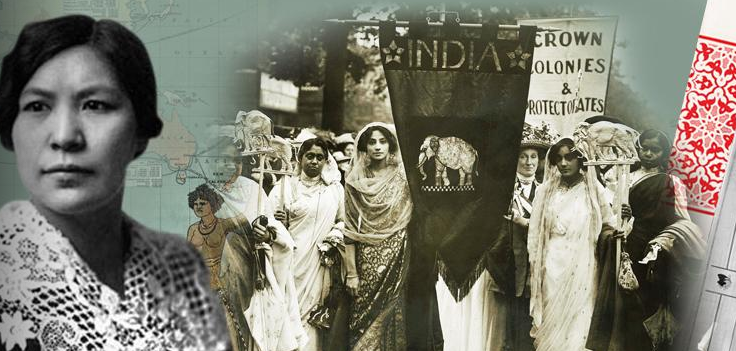
Through April 18, 2017, The Library has a trial of Women and Social Movements in Modern Empires since 1820, a supplement to Women and Social Movements, International. Documents included in this digitized resource explore prominent themes in world history since 1820: conquest, colonization, settlement, resistance, and post-coloniality, as told through women’s voices.
For more information about the content included in this collection, click HERE.
Event: Maps & More: Evolution of the 20th century Mongolia/China border (in maps)
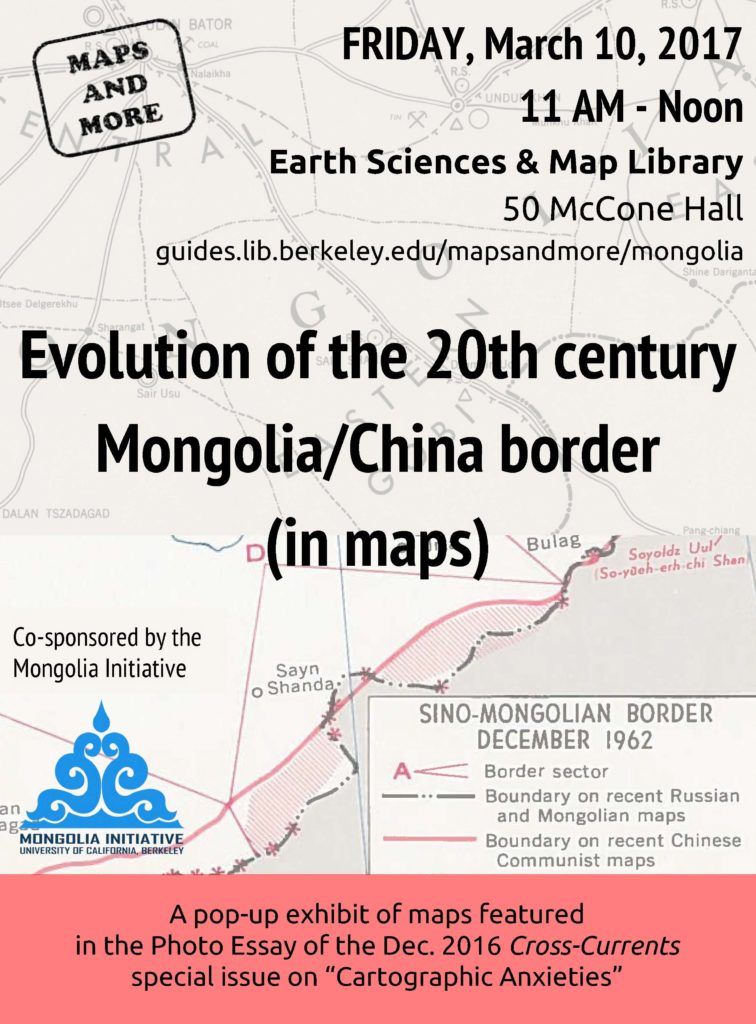
Workshop: Citation Management: New RefWorks
The Library is offering a workshop on the citation management tool RefWorks:
Friday, March 17, 2017 add to bCal
12:10pm-1pm
Bioscience Library Training Room
RefWorks is a citation manager that allows you to organize citations, import them from databases, store pdfs, and insert references and bibliographies into documents (MS Word and Google Docs).
New RefWorks has a new look and feel from its previous iteration. This hands-on workshop will cover the basics of navigating the new interface, organizing your citation library, creating new citations, importing citations from various databases, inserting references and creating bibliographies in Google Docs and Microsoft Word.
Please create a RefWorks account prior to class. If you already have a RefWorks account in the legacy RefWorks, you be shown how to migrate it to the New RefWorks platform.
The Bioscience Library Training Room is equipped with PCs, but you are welcome to bring your laptop. Please, no food or drink in the Training Room.
Event: Cartographic Materialities: Mapping the Pre-Modern World (A Symposium)
The Andrew W. Mellon Fellowship of Scholars in Critical Bibliography and the Designated Emphasis in Renaissance and Early Modern Studies Present:
Cartographic Materialities: Mapping the Pre-Modern World (A Symposium)
THURSDAY, MARCH 2
3:30-5:00 – Cartographic Objects Workshop at the Bancroft Library (David Faulds)
Please RSVP to jraisch@berkeley.edu
FRIDAY, MARCH 3
1:15-2:45 – Graduate Student Panel, 308A Doe Library
Keith Budner (Comparative Literature) – “From Geography to Chorography: Representing Pomponius Mela, Ptolemy and Strabo in Two Spanish Renaissance Maps”
Jason Rozumalski (History) – “Kaleidoscopes of Time and Place: Images of places as events in sixteenth-century England”
Grace Harpster (Art History) – “Pastoral Maps: Devotional and Administrative Itineraries in Rural Sixteenth-Century Milan”
Moderator: Diego Pirillo (Italian)
3:00-5:00 – Plenary Panel, 308A Doe Library
Tom Conley (Romance Languages, Harvard) – “Baroque Hydrographies”
Ricardo Padrón (Spanish, UVA) – “The Indies and the Printed Page: Inventing America on the Ramusio Map of 1534”
Valerie Kivelson (History, Michigan) – “An Early Modern Great Game: Maps of Siberia and their Circulation in the 17th and 18th century”
Moderator: Timothy Hampton (French and Comparative Literature)
http://guides.lib.berkeley.edu/cartographic-materialities
Trial: Four primary source modules from ProQuest
The Library will soon be acquiring four additional primary source collections from ProQuest. In the meantime, we have set up trial access to them until March 16.
FBI Confidential Files and Radical Politics in the U.S., 1945-1972
Southern Life and African American History, 1775-1915, Plantation Records, Part 2
Confidential U.S. State Department Central Files, Africa and Middle East, 1960-1969
Women at Work during World War II: Rosie the Riveter and the Women’s Army Corps
Event: Bancroft Round Table, Thursday 2/16
Bancroft Library’s first Round Table of the semester will take place in the Lewis-Latimer Room of The Faculty Club at noon on Thursday, February 16. Cathy Cade, documentary photographer, will present “Views of the Women’s Liberation and Feminist Movements of the 1970s and 1980s: Selections from the Cathy Cade Photograph Archive.”
__________________________________________________________
Cathy Cade was introduced to the power of documentary photography as she participated in the Southern Freedom Movement of the 1960s. In the years that followed, she took an array of images that depict the women’s liberation movement, union women, trades women, lesbian feminism, lesbian mothering, lesbians of color, LGBT freedom days, fat activism, and the disability rights movement. Cade will speak of her personal experiences with social justice causes and the connections between these movements and communities. She will feature highlights drawn from her extensive photograph archive acquired by The Bancroft Library over the past several years.
We hope to see you there.
José Adrián Barragán-Álvarez and Kathi Neal
Bancroft Library Staff